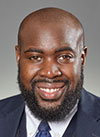I originally intended for this column to focus on the recent jury trial and conviction of former Minneapolis police officer Derek Chauvin for the murder of George Floyd on May 25, 2020. Instead, I chose to reflect on how the events of last year – particularly the deaths of George Floyd, Ahmaud Arbery, and Breonna Taylor – inspired hope and purpose. Floyd’s murder resulted in a global movement to fight against the historical inequities that exist for Black and other historically marginalized communities. On the one hand, this global response to the racial injustices experienced by Black people in America made me feel optimistic, but on the other hand, I couldn’t help but question, why now?
 Alexander M. Lodge, Iowa 2016, practices with Cargill Inc., a Minneapolis-based corporation. He is a Building Bridges liaison to the State Bar of Wisconsin Board of Governors and a member of the State Bar’s Racial Justice Work Group.
Alexander M. Lodge, Iowa 2016, practices with Cargill Inc., a Minneapolis-based corporation. He is a Building Bridges liaison to the State Bar of Wisconsin Board of Governors and a member of the State Bar’s Racial Justice Work Group.
We have undoubtedly been here before. I recall August 2014 and the shooting of Michael Brown in Ferguson, Missouri. Much like Floyd’s murder, Brown’s death sparked the same conversations about the inequities that exist for Black people during law enforcement interactions.
When Michael Brown was shot, I was a 2L at the University of Iowa College of Law and ran a mentor program working with Black and Latino boys in grades 4-6. In front of my group of 20-plus boys, I attempted to help them process the hurt, confusion, and fear we all were feeling. What I did not expect was the resilience these young men showed and the optimism they shared in witnessing the collective work of young protesters engaging in the grassroots movement for Black equality and social justice. Their infectious hope and optimism inspired me, in part, to turn my own feelings into action, which included co-developing and teaching a curriculum with a law school classmate during my 3L year focused on equipping youth in Iowa City, Iowa, with the fundamentals of the Fourth Amendment.
So, what makes now different? In my mind, Floyd’s murder was an awakening for many people around the world to the racial injustices, such as police brutality, faced by Black people in the United States. The backdrop of a global pandemic only exacerbated the historical socioeconomic inequities Black Americans have known to always exist. Despite the pain and trauma associated with both occurrences, we watched the world respond with a collective call to action.
After witnessing the protest movement in Ferguson, I found inspiration and hope watching another generation of young men (including some of my former mentees) and young women galvanize into action to seek justice for George Floyd. As Angela Davis stated so eloquently in her book Freedom is a Constant Struggle, “[i]t is in collectivities that we find reservoirs of hope and optimism.”
While some may have found a measure of solace in Derek Chauvin’s conviction alone, I instead found hope and inspiration in the collective work and responsibility we all witnessed in the wake of Floyd’s murder. Importantly, I’m inspired by my colleagues across the State Bar of Wisconsin who are committed to educating, empowering, and advocating on behalf of communities to combat the inequities of racial injustice.
» Cite this article: 94 Wis. Law. 72 (May 2021).
